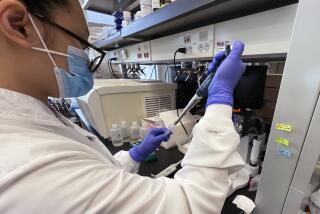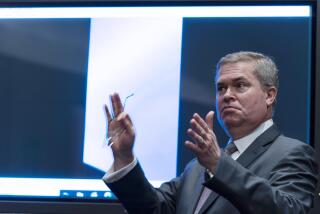FDA to require proof that new devices can be cleaned reliably
The Food and Drug Administration, under fire for its slow response to superbug outbreaks from tainted medical scopes, said it will now require proof from manufacturers that new devices can be cleaned reliably.
Until now, companies could simply confirm to the FDA that their instructions for cleaning the reusable scopes actually worked.
Some medical experts and lawmakers welcomed the agency’s move Thursday as a way to better protect patients from dangerous infections. But they continued to question why regulators have taken so long to act and whether tougher measures may be needed.
“I continue to be concerned about why these infections occurred in the first place and whether there is more we can do to prevent them from happening again,” said Sen. Patty Murray (D-Wash.).
FDA officials stood by their earlier decision not to recall any of the devices, known as duodenoscopes, that are at the center of deadly superbug outbreaks at several U.S. hospitals, including UCLA and Cedars-Sinai Medical Center.
At those two Los Angeles hospitals, 11 patients were infected with bacteria known as carbapenem-resistant Enterobacteriaceae, or CRE, which is highly resistant to antibiotics. More than 200 other patients were possibly exposed to the superbug, which can kill up to 50% of those infected.
Regulators said Thursday they have no authority to require manufacturers to redesign the duodenoscopes that are so difficult to clean.
The FDA also said that it was issuing new rules for cleaning the scopes and a wide range of other reusable medical devices. The agency had first proposed the rules four years ago, but had never finalized them.
Dr. Stephen Ostroff, the FDA’s chief scientist, said the agency had “accelerated” its work on the proposed rules after the recent outbreaks in Los Angeles.
Ostroff reiterated the agency’s position that recalling the scopes would do more harm than good because they are essential for treating seriously ill patients battling cancers and blockages in their digestive tracts.
He cited FDA data showing it had received reports of 135 patient infections linked to these scopes from January 2013 to December 2014. The lighted and flexible scopes are used in a procedure known as endoscopic retrograde cholangiopancreatography, or ERCP.
Ostroff said any infections are troubling, particularly those involving antibiotic-resistant bacteria, but the risk remains low compared with the 500,000 ERCP procedures done annually.
“It is by far the lowest-risk way to diagnose and treat these very serious medical problems,” Ostroff said. “Therefore, it’s essential that we examine this problem from A to Z.”
But some doctors, health officials and patient-safety experts warn that the true number of scope-related infections may be much higher because many cases have gone undetected or unreported.
“There are indications the infection rate is significantly underreported, and that calls into question the FDA’s conclusions and lack of action,” said Lawrence Muscarella, a hospital-safety consultant in Montgomeryville, Pa.
Muscarella said requiring manufacturers to show that reusable medical devices can be cleaned thoroughly marks a “significant improvement over where we are now. But that one step might not be enough.”
U.S. Rep. Ted Lieu (D-Los Angeles) said he questions whether the FDA knows the full extent of the infection risk from the scopes. He said he will continue his push to require hospitals to report superbug infections.
In the meantime Thursday, the Centers for Disease Control and Prevention advised hospitals and doctors on how to routinely check their duodenoscopes for bacterial growth after they have been cleaned as an additional safety precaution.
Under the new FDA rules, manufacturers will now be required to submit data to the agency that shows their new devices can be successfully cleaned. Before getting FDA approval for a device, the companies must perform tests that show the devices can be disinfected or sterilized by following manufacturers’ instructions.
Last month, the agency warned doctors that the duodenoscopes may not be free of bacteria even if they follow the manufacturers’ cleaning instructions. Bacteria can become trapped in tiny crevices near the tip of the devices.
The FDA has already imposed these new guidelines on makers of duodenoscopes, but they don’t apply to other products on the market.
In spring 2014, agency officials asked Olympus, which sold the scopes used at UCLA and Cedars-Sinai, and two other scope makers, Pentax Medical and Fujifilm, for test results showing that their scopes could be cleaned of bacteria.
All three companies have failed twice to submit adequate data, according to the FDA, and officials are waiting for more information from the firms.
A spokesman for Olympus said the company is “carefully reviewing the FDA guidance” and it would be premature to comment further.
Representatives for Pentax Medical and Fujifilm couldn’t be reached for comment Thursday on the FDA’s actions. In previous statements, the companies have said they are taking the infections seriously and working with regulators, doctors and customers to ensure patient safety.
The FDA has come under intense criticism for allowing the biggest manufacturer of duodenoscopes, Olympus, to sell a device without the necessary government approval since 2010.
Olympus has said the company didn’t believe further regulatory approval was necessary for the 2010 redesign of its TJF-Q180V duodenoscope. At the FDA’s request, the company subsequently filed for approval, which is pending.
The FDA said it will hold a two-day meeting in mid-May to further examine the infection risk posed by duodenoscopes and potential remedies.
Twitter: @chadterhune
Twitter: @melodypetersen
More to Read
Inside the business of entertainment
The Wide Shot brings you news, analysis and insights on everything from streaming wars to production — and what it all means for the future.
You may occasionally receive promotional content from the Los Angeles Times.












